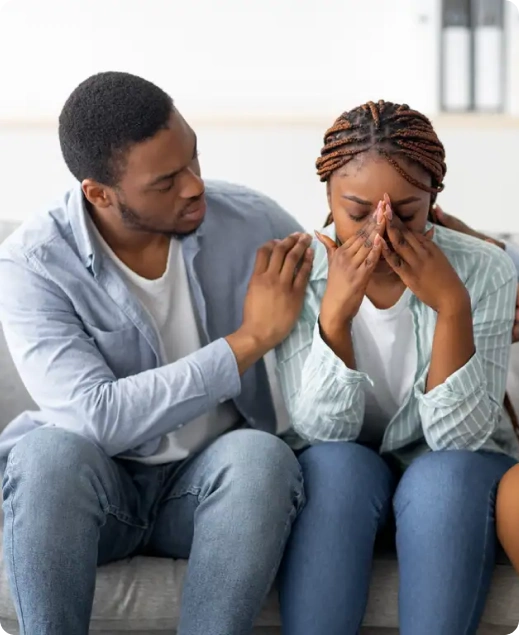Depressive disorder (also known as depression) is a common mental disorder. It involves a depressed mood or loss of pleasure or interest in activities for long periods. Depression is different from regular mood changes and feelings about everyday life. It can affect all aspects of life, including family, friends, and community relationships. It can result from or lead to problems at school, work, daily functioning, and goal attainment. Depression is one of the most common psychiatric disorders. Approximately 5 % of the U.S. population ages 18 and older experience depression each year. People who have lived through abuse, suffer losses or other stressful events are more likely to develop depression. Women are 50 % more likely to have depression than men. Depression is associated with high mortality and 15 % die by suicide.
Signs And Symptoms of Depression
At Living Spring Family Psychiatry, we understand that the signs of depression can manifest emotionally, physically, and behaviorally. Symptoms of depression can vary wildly. For example, some people exhibit uncontrolled irritability, while others do not have the energy to get out of bed. Furthermore, people with similar symptoms may have different severities of each one.
Depression diagnoses symptoms:
Low or depressed mood daily
Intrusive thoughts about death or committing suicide
Feeling uninterested in activities
Difficulty concentrating or with memory
Unintended weight loss or gain
Trouble with sleep
Fatigue or low energy levels
Slowed movements
Fidgeting
Irritability
Depression diagnoses symptoms:
A few symptoms do not fit the diagnostic criteria but are common in people with depression
Irritability
Changes in appetite
Anxiety
Psychosis

Note: It’s essential to remember that depression’s symptoms can vary in severity and duration from one person to the next. Some might experience most of these symptoms, while others might only notice a few. Recognizing these symptoms is the first step toward seeking help and finding a path to healing. Understanding the root problem often helps clinicians and clients design the right treatment plan. Some clients have one apparent reason behind their depression, but others may have a mixture of issues playing a role in their disorder.


Causes and Risk Factors
Depression is multifaceted and can result from a combination of genetic, biochemical, environmental, and psychological factors. Some of the prominent causes and risk factors are:
Genetics- Family History
Studies have indicated that individuals with a family history of depression are more likely to experience it themselves. The presence of specific genes might increase susceptibility, but it’s the combination of genes and environmental stressors that often triggers the onset.
Environmental stressors
Traumatic Life Events
Major life changes or traumatic events, such as the loss of a loved one, a challenging breakup, physical or emotional trauma, or financial difficulties, can act as catalysts for depression.
Abuse
Past physical, emotional, or sexual abuse can significantly increase the risk of depression later in life.
Prolonged Stress
Continuous exposure to stressful environments, be it at home, work, or any other setting, can erode mental resilience and precipitate depressive episodes.
Environmental stressors
Traumatic Life Events
Major life changes or traumatic events, such as the loss of a loved one, a challenging breakup, physical or emotional trauma, or financial difficulties, can act as catalysts for depression.
Abuse
Past physical, emotional, or sexual abuse can significantly increase the risk of depression later in life.
Prolonged Stress
Continuous exposure to stressful environments, be it at home, work, or any other setting, can erode mental resilience and precipitate depressive episodes.
Trauma Or Stressful Events
Stressful events can contribute to depression or cause situational depression.
- Financial challenges
- Losing employment
- Relationship or marital problems
- Traumatic event: abuse,violence
Underlying Medical Conditions
Sometimes depression is a symptom of a physical health problem. People with untreated thyroid or autoimmune diseases may feel depressed alongside other signs. Individuals who experienced strokes or have dementia can also exhibit signs of depression. As well as having a chronic health problem or living with chronic pain. It is vital to discuss with a medical professional the signs and symptoms you are having. To treat these types of depression, clinicians must treat the condition behind the depression.
Psychotherapy
Cognitive Behavioral Therapy (CBT)
This widely recognized form of psychotherapy helps patients identify and reframe negative thought patterns. It equips individuals with valuable tools to understand and effectively manage their depression.
Medication Management
Our experienced professionals may recommend antidepressant medications to help balance brain chemicals. These medications are chosen based on careful evaluation and personalized to your specific needs, with close monitoring of their effectiveness and any potential side effects.
Lifestyle Changes
We emphasize the importance of holistic well-being, which includes making healthy choices in your daily life. This involves:
Nutrition:
Guidance on maintaining a balanced diet to support your mental and physical health.
Exercise
Encouragement to engage in regular physical activity, which can boost mood and overall well-being.
Sleep Hygiene
Strategies to establish healthy sleep patterns, as quality sleep is crucial for mental health.
Alternative Therapies
We recognize that each individual’s path to healing is unique. Alongside traditional treatments, we offer alternative therapies that can complement your care, including:
Meditation and Mindfulness
Techniques to help you manage stress, improve focus, and find emotional balance.
Acupuncture
An ancient practice known for its potential to alleviate depressive symptoms and promote relaxation.
Deep-Breathing Exercises
Simple yet effective methods for reducing anxiety and enhancing emotional well-being.


Frequently asked questions
How can Living Spring Family Psychiatry help with my depression?
A mental health provider can discuss nonpharmacological and pharmacological treatments to help improve your quality of life.
What to expect at my first appointment?
You will receive an email confirming your appointment. You will be able to complete the online patient forms prior to your appointment. During your appointment, your provider will review with you your forms, discuss your concerns and provide you with a tailored treatment plan.
How do I know if I have depression?
The best approach is to discuss your symptoms with a medical professional.
When should I seek emergency care for my depression?
If you are having thoughts of suicide, self-harm, or wanting to harm others, call or chat with the national suicide prevention lifeline at 1800-273-8255.
741-741: If you’re in emotional distress, text HOME to connect with a counselor immediately.
Call or text 988: the National Suicide Prevention Lifeline for 24/7 emotional support.
If you’re having a medical or mental health emergency, call 911 or go to your local ER.


